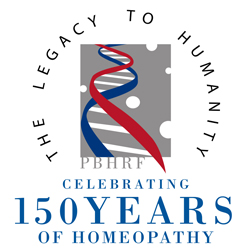

Backed by four decades of research behind them Dr. Prasanta Banerji & Dr. Pratip Banerji had presented their scientific papers in various international homeopathic conferences.
Corfu - It was during the 5th International Conference of Anticancer Research, Corfu, Greece, in the year 1995, they first caught US attention. The global impact was felt immediately after the Banerji’s, the only homeopathic practitioners among 1200 physicians and cancer researchers attending the conference, presented 16 brain tumor regression cases treated with only homeopathic medicines.
The University of Texas MD Anderson Cancer Center in Houston – Dr. Sen Pathak, Prof. of Cell Biology & Genetics, at the University of Texas MD Anderson Cancer Center, Houston, collaborated in this joint research between the PBHRF and the MDACC. The research work is now complete and published. The study entailed an in vitro study with the medicines Ruta 6 and Calcarea Phosphorica 3X showed brilliant results in killing brain cancer cells while activating the normal cells. The paper entitled “Ruta 6 selectively induces cell death in brain cancer cells but proliferation in normal peripheral blood lymphocytes: A novel treatment for human brain cancer” was jointly published with Pathak S, Multani AS, of the Department of Molecular Genetics, M.D. Anderson Cancer Center, Houston, USA., in the October 2003 issue of the International Journal of Oncology.
National Cancer Institute (NIH), US - At present, the world leaders in the field of medical research are the American Universities. These institutions, due to their vast resources, today control all future trends in medical technology. One such mammoth institution is the US government’s National Cancer Institute which launched its Best Case Series Program in 1991 to seek out alternative approaches to cancer treatment and support prospective research projects utilizing therapies identified through this program.
Dr Prasanta Banerji, Founder & Managing Trustee, PBHRF, & Dr Pratip Banerji, Co-founder & Deputy Managing Trustee, PBHRF, submitted their Best Case Series to NCI in March 1998. The Banerji’s put together 14 cases; “not our best cases”, said Dr Pratip Banerji, “but most complete”. It was a retrospective examination of 14 cases involving patients with various malignancies, of which, seven cases were of lung cancer. NCI accepted the series as complete in March 1999, and their presentation to the CAPCAM (Cancer Advisory Panel for Complementary and Alternative Medicine) occurred in July 1999. "Our sole purpose in submitting the Best Case Series was to tread a positive path in the establishment of homeopathy as a well-publicized and effective mode of complementary and alternative medicine treatment," said Dr Prasanta Banerji. This resulted in a first ever tie-up of an US health institution with any branch of alternative medicine for research on cancer treatment.
The letter of agreement, signed with PBHRF by US-based National Cancer Institute’s office of Cancer Complementary and Alternative Medicines (OCCAM) and The National Institute of Health, Maryland, is the world’s first letter of agreement that recognizes the importance of homeopathy in the treatment of lung cancer.
Since then, many such research tie-ups have been carried out and we receive more and more , as results of our treatment are getting a lot of attention in the scientific community.